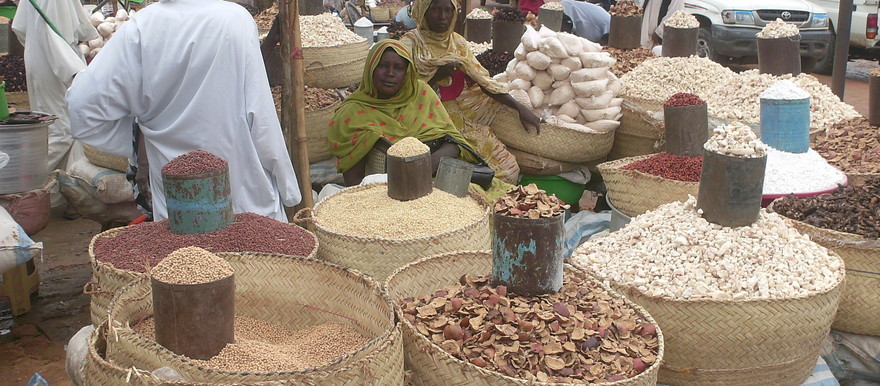The residents of South Sudan’s Warrap state are appealing to both state and national governments to intervene over increasing prices of commodities in all major towns of the state.
Several residents speaking to Radio Tamazuj across the state say life has become unbearable in recent months following the hiking of prices for basic goods such as sorghum, flour, sugar, meat among others in all markets across the state.
“The market started deteriorating right from July,” said Rose Adut, a restaurant owner in Kuajok. “Things are very expensive, the prices of flour and meat have changed and there is nothing good in the market. Currently, half a kilo of meat is 700 SSP, it was at 500 SSP, the small sack of flour of 25kgs costs 14,000 SSP from 6,000 SSP and wheat flour is also selling at 14,000 SSP, previously at 6,000 SSP,”
Adut said changes in prices daily have incapacitated her business. She added they are not doing business to make a profit but rather to keep their businesses from collapsing.
“We are not working for profit, but to keep ourselves in the market busy, you work at the end of the day the money goes back for an exchange of commodities, leaving you with nothing at hands, we are appealing to government to reduce prices a bit at least to be like before,” Adut said.
She also accused some government officials of taking advantage of the situation and working with some traders to exploit the local people.
Ayak Ayok, a 30-year-old mother of three, and a resident of Kuajok town said market prices keep fluctuating hourly.
“The prices are not stable. Every time you go to the market you find new prices, if you get something at 200 or 500 SSP and you leave it saying I will come and buy it tomorrow, you will find it is over 800 to 1,000 SSP,” Ayok said.
Ayok, a 30 years old woman said her life is bad. She appealed to state authorities to intervene in the market.
But the chamber of commerce in Warrap has noted that the state government has put measures to ensure that prices remain reasonable in the markets.
“Our prices in Warrap state are better than prices in other states, and this is because the governor of Warrap state issued an order on 13th of July banning levying of taxes on food commodities in the state headquarters and counties as well as abolishing roadblocks until October 1st, so our prices are down as compared to other states," said Akec Mayar Kok, the chamber's chairperson.
Kok further dismissed complaints from residents that prices of commodities have skyrocketed in recent months.
“It should be noted that right from the time the state government banned levying of taxes, it has not increased and it has not reduced. The one who claims that a bag of flour was 6,000 SSP is lying,’’ said Mayar Akok.
According to Mayar, newly harvested products will solve some of the economic difficulties the citizens are experiencing.
Anthony Angony Mayar, a member of the organized forces residing in Gogrial town said life had become difficult with the prevailing economic situation made worse by the absence of salaries.
“The prices in the market are bad. We do not receive our salaries. The government knows where our salaries are. We also don't have the power to demand our money by force,” Angony said.
Apart from asking the authorities to pay salaries for government employees promptly, Angony called for an upward review of salaries for civil servants commensurate with inflation.
Chief Ayuel Atem Muorter, a resident of Twic County says, current economic hardship is something endemic in the region and requires multifaceted approaches.
“I have three appeals to the governor and president, help the governor to rehabilitate the Abyei road, this road can help citizens in Aweil, Wau, and citizens of Kuajok. Secondly, the government should buy and store foodstuffs and sell them at affordable prices preferably to women, not men because women can take the food to the children but the men will buy and store them and sell at a later date expensively,” said Atem.
Ayuel said dealers are to blame for the increased prices of locally produced commodities saying they buy cheaply from locals, hoard then, and resale at high prices to the same population.
“In the market, you find local people selling the Malou (5 kilos) of sorghum at SSP 500, and at the same time some traders are selling the same quantity at 1,000 SSP,” said Atem.
Aguek Anyuon, another restaurant owner in Tonj town faulted the government for not regulating market prices.
“The issue of prices in Tonj is serious, the kilo of wheat flour is 600 SSP, a kilo of maize flour is 650 SSP and Malou (5 kilos) of sorghum is at 1,650 SSP, a bag of charcoal at 1,700 SSP. When a small fish is caught from the river it costs 1,500 SSP and big fish costs 2,500 to 3,500 SSP,” Anyuon said. “Market is random, nobody asks traders about the prices.”




